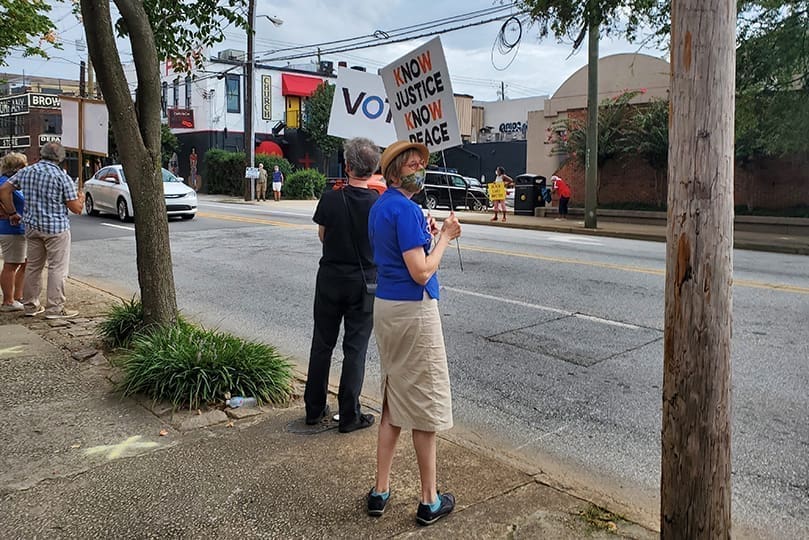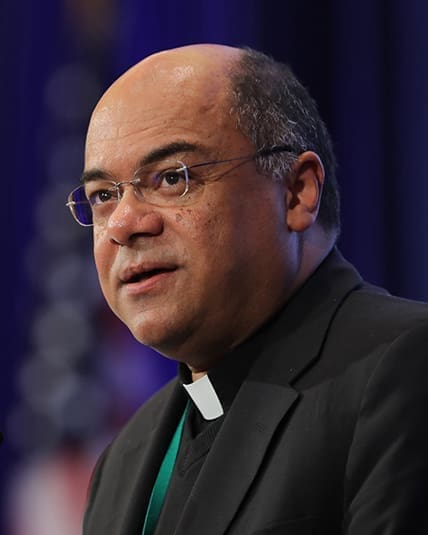 Photo by Samantha Smith
Photo by Samantha SmithAtlanta
Prayer, action encouraged to end racism
By SAMANTHA SMITH, Staff Writer | Published September 3, 2020
ATLANTA—On Aug. 28, more than 50 parishioners of Our Lady of Lourdes Church in Atlanta filled the street Boulevard, from Auburn Avenue to Edgewood Avenue, to protest racial injustice.
The protest was organized by the church in the Old Fourth Ward neighborhood. The parish sits in the heart of Atlanta social justice monuments, south of John Lewis Freedom Parkway, and close to The King Center, the birth home of Dr. Martin Luther King Jr. and Ebenezer Baptist Church.
A little rain did not discourage parishioners from participating. Some wore church T-shirts and held umbrellas and signs in solidarity with lives lost due to racism. Drivers blew their horns and waved to protestors as they stood along the street.
Protestors are representative of the church, said Carmen Jenkins, an active member of the parish. People of different races and ages came out to show their support, she said.
Members of the finance and pastoral councils approached Father Jeffery Ott, OP, pastor, about doing something to stand in solidarity against racial injustice. In an effort to raise their voices and be safe, “Stand for Justice” was formed. Since that conversation, there have been four events, with one in front of the governor’s mansion.
“Faith takes many forms,” said Father Ott. “And one of the most powerful forms is the expression of coming together as a community of faith.”
The pastor has been encouraged and surprised by the number of participants, usually falling between 80-100 people. He’s also enjoyed some of the signs, such as “Know Justice, Know Peace.”
Parishioners are “feeling the love, they’re feeling the connection, they’re feeling the unity,” said Father Ott. “They want to express their desire for justice on behalf of all those who are oppressed in our society and in our community.”
With the deaths of Ahmaud Arbery, Breonna Taylor, George Floyd, Rayshard Brooks and others, conversations regarding racism have been growing over recent months. At this year’s Atlanta Catechist Conference, there were sessions about the church’s response to racism and advice on having conversations within parishes, youth groups and family dinner tables.

Bishop Shelton J. Fabre of Houma-Thibodaux, La., chair of the U.S. Conference of Catholic Bishops’ Ad Hoc Committee Against Racism, was a presenter during the August 2020 virtual Atlanta Catechist Conference. CNS photo/Bob Roller
“We still have a long way to go both inside and outside of the church to realize the harmony to which we are called as a human family,” said Bishop Shelton J. Fabre from the Diocese of Houma-Thibodaux in Louisiana, and a conference presenter. “Tragically, the divisive force of this sin of racism continues to be felt across our land, in our society and even in our church structures.”
Bishop Fabre also serves as chair of the U.S. Conference of Catholic Bishops ad-hoc committee against racism. The bishop discussed, “Open Wide Our Hearts,” a pastoral letter against racism released in 2018.
“A primary way forward as presented in ‘Open Wide Our Hearts’ is for us to understand and proclaim that racism is a life issue,” said Bishop Fabre. “Racism attacks the human life and dignity of its victims. As followers of Jesus Christ and as ministers in the church, we cannot ignore or overlook this reality.”
To end racism, Bishop Fabre explained that we must recognize and respond to racism as a life issue, seek to overcome individualism, encounter others racially different from us, educate ourselves on how to minister in a multicultural church and to seek the conversion of our hearts and others.
To do all these things we must be guided by prayer, said the bishop.
“Prayer is often dismissed in these times as having no effect,” said Bishop Fabre. “You and I know the power of prayer because we know that prayer changes people and people change situations. Authentic prayer always leads to constructive action, and our constructive actions must always be guided by our authentic prayer.”
For additional resources from the USCCB ad-hoc committee on racism, visit usccb.org/racism.